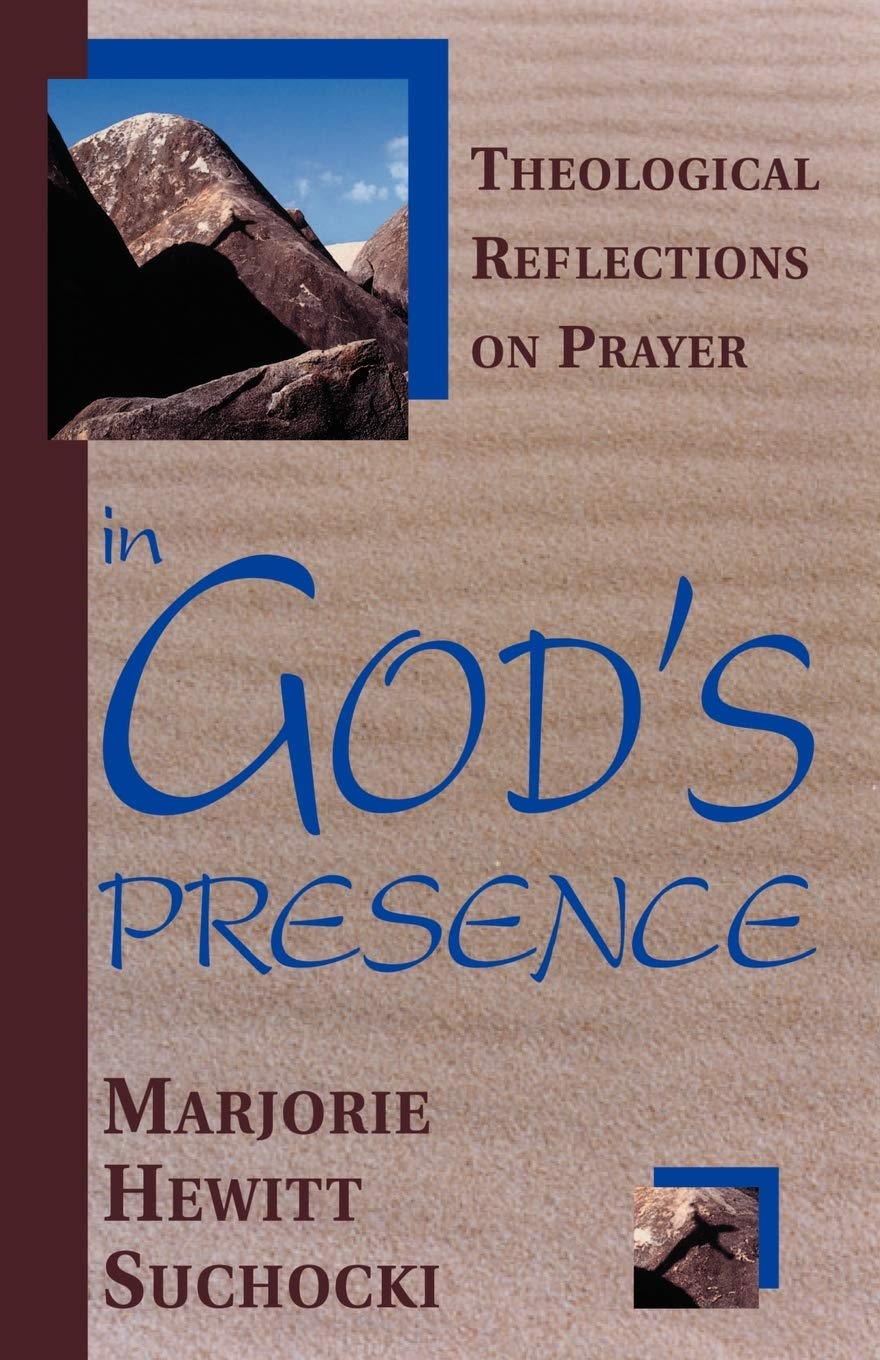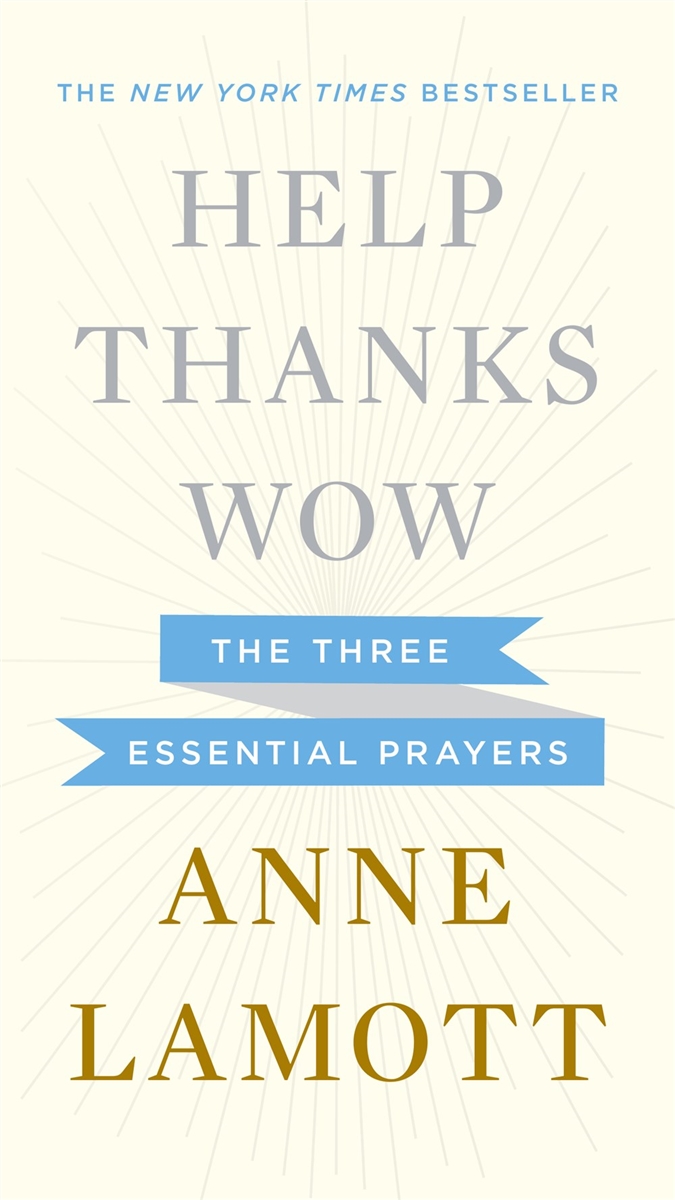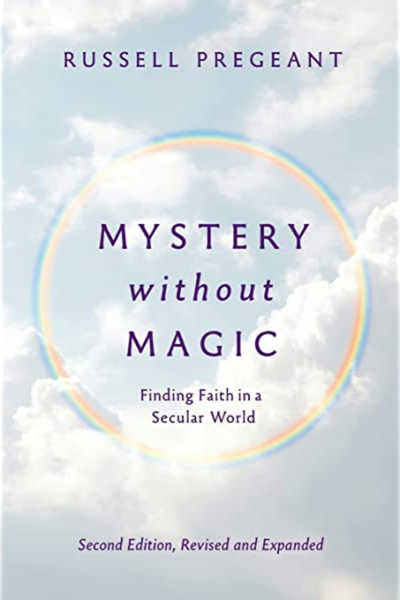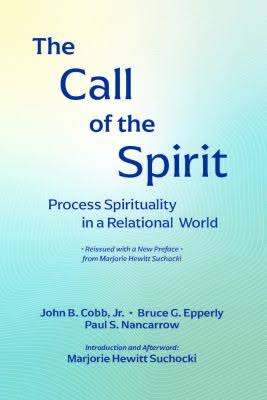Newsletter Winter 2022

Help, Thanks, Wow!
“Gorgeous, amazing things come into our lives when we are paying attention: mangoes, grandnieces, Bach, ponds. This happens more often when we have as little expectation as possible. If you say, 'Well, that's pretty much what I thought I'd see,' you are in trouble. At that point you have to ask yourself why you are even here. . . . Astonishing material and revelation appear in our lives all the time. Let it be. Unto us, so much is given. We just have to be open for business.”
–Anne Lamott, Help Thanks Wow
The Tiger & The Strawberry
The following ancient story, known as a “koan,” from the Zen Buddhist faith tradition offers a useful insight into 2020.
Once upon a time, as a man was walking through a forest, he saw a tiger peering out at him from the underbrush. As the man turned to run, he heard the tiger spring after him to give chase.
Barely ahead of the tiger, running for his life, our hero came to the edge of a steep cliff. Clinging onto a strong vine, the man climbed over the cliff edge just as the tiger was about to pounce.
Hanging over the side of the cliff, with the hungry tiger pacing above him, the man looked down and was dismayed to see another tiger, stalking the ravine far below. Just then, a tiny mouse darted out from a crack in the cliff face above him and began to gnaw at the vine.
At that precise moment, the man noticed a patch of wild strawberries growing from a clump of earth near where he dangled. Reaching out, he plucked one. It was plump, and perfectly ripe; warmed by the sunshine.
He popped the strawberry into his mouth. It was perfectly delicious.
The End.

Kanō Sanraku, Dragon and Tiger, early Edo period, 17th century, pair of folding screens, color and gold on paper, 178 x 357 cm each (Myoshinji temple, Kyoto, image: Wikimedia Commons)
I have been reflecting on this koan lately as I try to find joy these days that feel under threat from every direction. There are different views of what this story is intended to teach us. Live in the moment is a common interpretation. An alternative perspective is don't be distracted by pleasure. It can also speak of our fear of death and avoidance of the topic. We can draw many lessons from a story, so I will highlight a different lesson.
We are coming up on the season of gratitude known as Thanksgiving. How do we muster up gratitude when these days it seems that so much is on the verge of falling apart? In my work as a hospice chaplain, I learn about living from my dying patients. What they teach me is that there is more than one prayer. As a process thinker, I see everything as interwoven. Gratitude is important, but we can’t untangle it from the other prayers. Anne Lamott wrote about three prayers in her book, Help Thanks, Wow. So yes, we can be grateful for all that makes our life joyful, but we can still say help! Help us fight climate change, be kinder to each other and please save our democracy! It’s okay on Thanksgiving Day to say "Help me, I’m afraid!" We don’t need to pretend for a moment that everything is fine because it’s a holiday. That is not what the koan is telling us. It teaches us to taste the strawberry anyway. Help me, there are tigers! Wow, this strawberry tastes good! Thank you.
-Kathleen Reeves, Community Relations Specialist
“Prayer means that, in some unique way, we believe we’re invited into a relationship with someone who hears us when we speak in silence.”
–Anne Lamott, Help Thanks Wow
Thanks
We live in a time of tremendous tragedy, turmoil, and terror. The world is filled with an all-too-wide variety of extreme crises and conflicts: political, economic, military, humanitarian, public health, cultural, and environmental. The dark realities are so pervasive and profound that sentiments of dejection, discouragement, and despair seem to be spreading further and sinking deeper every day. A spirit of malaise marks the defining mood for many.
Although the extent of suffering and depth of dissatisfaction cannot be denied, it is only one side of a multifaceted story. Awareness of and responsiveness to both the symptoms and sources of the problems are also increasing. A growing number of governments, civic institutions, nonprofit organizations, and community groups are organizing, cooperating, and working to improve our collective condition. Indeed, I feel extremely fortunate and grateful to be part of an organization whose primary focus is promoting modes of thought and forms of behavior that contribute to the well-being of individuals, communities, and the world.
At the Cobb Institute we’re currently asking our community members to consider why it matters. One way of expressing why the Institute matters to me is that the matters of the Institute are what truly matter. Process-relational ways of understanding and living matter because they provide a lens for seeing and a basis for behaving that are more adequately attuned to and fully in harmony with the true nature of reality. Communities that are just and compassionate matter because they affirm the intrinsic value of every individual, nurture the unique contributions of each member, and foster the flourishing of all persons. Ecological civilizations matter because they recognize that every individual and community inhabits and impacts a world in such a way that the health and well-being of the parts depend on the health and well-being of the whole, and the health and well-being of the whole depends on the health and well-being of the parts.
The Institute matters because our collective ability to not only survive but also thrive might depend on our willingness to think and act process-relational ways, to create just and compassionate communities, and to build ecological civilizations. And because the matters with which it is concerned truly matter—to me as an individual, to us as a community, and to our world in its totality—I’m enormously thankful to be part of it.  To express gratitude in the face of a world filled with crisis is not to ignore the reality of our stark situation but to affirm the role we played in causing it, express the hope that we can improve it, and instill the desire to overcome it.
To express gratitude in the face of a world filled with crisis is not to ignore the reality of our stark situation but to affirm the role we played in causing it, express the hope that we can improve it, and instill the desire to overcome it.
So I’m thankful to work with a board of directors that is extremely wise in its deliberations, fully committed to our mission, and intensely active in carrying out our vision. I’m thankful to serve side by side with staff members who are extremely gifted and demonstrate an awareness of the importance of our work in all they do. I’m thankful for the generosity of our donors, without whom we simply would not exist. I’m thankful for a group of volunteers who enthusiastically and generously give their time, energy, and talent help us realize our aims. And, last but certainly not least, I’m thankful for our wonderful community members contribute excitement, passion, and insight to us every bit as much as they receive it from us.
Through each drop of experience and every occasion of interaction may we continue to advance wisdom, harmony, and the common good together.
-Richard Livingston, Executive Director
Help
One of my favorite daily devotionals begins the year asking "How many souls may you help this year?" Over the decades as I have considered that question it has evolved several times. It has expanded into variations such as: How may we help raise hope? How may we help others heal? and more recently How may we help heal planet Earth?
When the pandemic hit, my creative partner and I sought ways to help others cope more skillfully given the challenging situations we faced. We were inspired to develop Mindful Blessings that evolved into helpful Blessisms and later during Earth Day into Earthisms for Loving, Honoring, and Protecting Mother Earth. Now as I think about The Three Essential Prayers, what gratefully comes to mind and heart is a simple three word prayer sentence Hope Helps Heal! Wow. Thanks Anne Lamott.
Charles Betterton has a Master's in Community Economic Development from Southern New Hampshire University, and has received numerous Special Achievement Awards for his service as Director of Disaster Field Offices for FEMA (formerly HUD). Charles has received the Highest Award for Achievement from the Dale Carnegie program, and received the highest cash award paid a HUD employee for improvements to the property management information system that saved an estimated 300 million dollars. While running two non-profits he founded, CENTER SPACE and the University for Successful Living, he turned down the HUD Community Builder Fellowship, worth $250,000 and study at the JFK School of Government at Harvard, so he could continue to focus on his impactful non-profit work. Charles works with John Cobb on the Living Earth Movement.
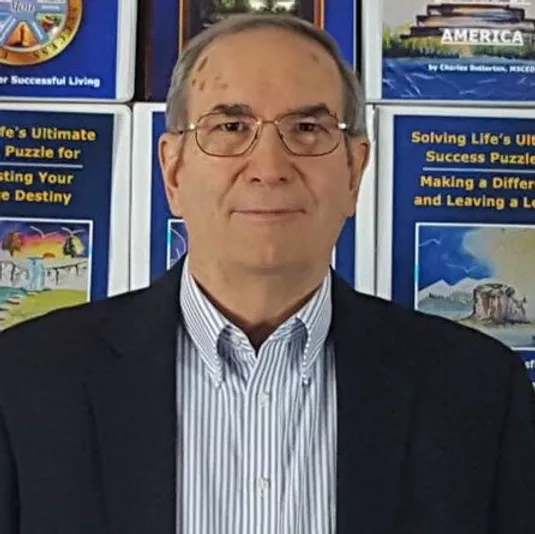
Wow
Wonder, Ask. See, Ask Further. Act, Wonder Anew.
“There is symbolic as well as actual beauty in the migration of the birds, the ebb and flow of the tides, the folded bud ready for the spring. There is something infinitely healing in the repeated refrains of nature - the assurance that dawn comes after night, and spring after the winter.” Rachel Carson, The Sense of Wonder
“If facts are the seeds that later produce knowledge and wisdom, then the emotions and the impressions of the senses are the fertile soil in which the seeds must grow. The years of early childhood are the time to prepare the soil. Once the emotions have been aroused - a sense of the beautiful, the excitement of the new and unknown, a feeling of sympathy, pity, admiration or love - then we wish for knowledge about the object of our emotional response. Once found, it has lasting meaning. It is more important to pave the way for the child to want to know than to put him on a diet of facts he is not ready to assimilate.” Rachel Carson, The Sense of Wonder.
 What Anne Lamott was saying as a poet, and Rachel Carson was telling us as a parent, grandparent and teacher, Alfred North Whitehead elaborated in The Aims of Education, written in 1929. In this classic work Whitehead described a helical cycle of the rhythm of learning from romance, to precision, to generalization and then starting anew with romance. Now a new book by Lynn De Jonghe spells out in detail how parents and teachers can bring these ideas alive in the ongoing events in the classroom, in the home, and in community life. Starting with Whitehead: Raising Children to Thrive in Treacherous Times is organized according to Whitehead’s cycle with three major sections representing Romance, Precision and Generalization. The Introduction opens with a discussion of the importance of adopting a process view of events to understand the nature of learning. The Conclusion presents an appeal to utilize a process relational perspective in responding to the challenges of rapidly changing times.
What Anne Lamott was saying as a poet, and Rachel Carson was telling us as a parent, grandparent and teacher, Alfred North Whitehead elaborated in The Aims of Education, written in 1929. In this classic work Whitehead described a helical cycle of the rhythm of learning from romance, to precision, to generalization and then starting anew with romance. Now a new book by Lynn De Jonghe spells out in detail how parents and teachers can bring these ideas alive in the ongoing events in the classroom, in the home, and in community life. Starting with Whitehead: Raising Children to Thrive in Treacherous Times is organized according to Whitehead’s cycle with three major sections representing Romance, Precision and Generalization. The Introduction opens with a discussion of the importance of adopting a process view of events to understand the nature of learning. The Conclusion presents an appeal to utilize a process relational perspective in responding to the challenges of rapidly changing times.
The five chapters of the first section on romance cover the sub-themes of curiosity, play, children’s voices (listening, writing, and criticism), experiencing success, and doing. The four chapters of the second section on precision address practice and mastery, deep learning, problem solving, and working collaboratively. The final section on generalization discusses the issues of integrating, cultivating empathy and justice, ecological interdependence, challenging opportunities, and building community.
This book offers examples of learning events at each stage that point the way for adults to help children thrive in a world of change. These events in each chapter are presented in the richness of their contexts and unfolding, rather than as dry results of controlled data gathering procedures. The events recorded here are based on the author’s extensive experience working directly with children as a parent, teacher, principal and policy maker. Drawing on the best of psychological and educational research, Dr. De Jonghe sets these exemplary events in a vigorous theoretical foundation and proposes specific strategies for success. Her recommendations have relevance not only for parents, but also for teachers, principals, and educational policy makers.
“Wonder takes our breath away, and leaves room for new breath.”
–Anne Lamott, Help Thanks Wow
The Arts: Poems Like Prayers: Help, Thanks, Wow!
I See God
in ocean depths
across prairie lands
and desert expanse
rolling hills
vast mountains
stars, galaxies.
And teacher
or cleric weary
with good works
young couple
holding hands through
downtown stroll
community volunteer
working for integration
at local high school
grandmother scolding
then embracing
errant teen.
The sacred,
immense
and close.
By Richard Bunce
First Morning
His eyes dim with fear
when he can’t remember
pills to take, how many, how often
and why they won’t make him
what he once was, even though
we welcomed him home yesterday,
with a toast at the dinner table,
assurances he will recover soon.
We concentrate this morning
on tasks to be done,
make coffee from fresh grinds,
wash last night’s wine glasses,
dishes and placemats, savor
our memories of good food
and cheers, so, for the moment,
his grief dissolves in a smile.
by Georgette Unis

Photo courtesy Marcos Paulo Prado
ON THE RAILS, 1949
They ride to town in a boxcar
stop on their way East.
Friendly
is how others describe it.
Real friendly town.
They wear ragged clothes
unshaven
smell of cattle.
Where to get a meal?
Hear a kind word?
Rumor has it
if you walk
a mile up the highway
past the houses on the hill
past the grocer on the right
past the farm on the left
there is a home with a star
above the second
story windows.
Knock quietly
and ask nicely you could
get a warm meal
maybe a piece of pie.
The lady is young
good cook
with three daughters
who doesn’t mind
talking with strangers
about the war
to find work
create a rural life.
They listen
while eating
on the front porch
under staring
eyes of children.
They are grateful
for the meal, dessert,
companionship,
then slowly head
back to the train
traveling to the freight
yards of New York.
© Veronica Michalowski, August 18, 2019
Community Building
Working for Integration and Synergy in the City of Pomona
While the Cobb Institute has historical roots in the relatively affluent city of Claremont CA, our Community Collaborations Working Group has regarded the neighboring city of Pomona as our primary service area. Pomona’s population of 150,000 has a poverty rate double the national average. Still, in the last ten years city councils have come to reflect its majority (70%) Latinx demographics, and Pomona is undergoing a kind of renaissance. The city council has shown itself to be open to novel, transformative approaches. In 2018, it voted unanimously to adopt the international Charter for Compassion, signaling its commitment to compassion as a core value. Since then, the school district, police department, and mental health clinic have all trained in restorative practices and are utilizing them widely and to good effect.

Where the Cobb Institute Fits In
Pomona has a large number of churches and nonprofits, but only a small fraction have actual paid staff with budgets. Cobb Institute members have been actively engaged with a number of boards, steering committees, and planning groups. Our aim to connect disparate groups and help integrate their visions and efforts, which often overlap in significant ways. These efforts are often helped by our sister agencies, such as the Institute for Ecological Civilization, Pando Populus, and the Wellbeing Economic Alliance.
One key alliance is the New Economy Working Group, initiated by Pomona-based Latino & Latina Round Table. This working group works to foster an economy in Pomona that works for everyone, particularly the underprivileged and underemployed. Its goals include (i) building community wealth; (ii) mobilizing local “anchor institutions” use their purchasing power to create jobs for local people and support local vendors; and (iii) increasing employee ownership via worker cooperatives. Cobb Institute board members Dick Bunce and Michael Witmer are members of this Working Group, which will soon approach Pomona City Council for funding to advance this work out of a federal grant to the city for COVID relief.
In August, the New Economy Working Group met with the Pomona Valley Community Farming Coalition as part of a strategy to connect and coordinate with mission-aligned groups. The Cobb Institute has worked extensively with community farmers for years. The two groups have agreed to look for synergies and opportunities to cooperate. Two ideas are to community farmer and food vendor coops and leasing arable land from anchor institutions.
“All these connections and opportunities have emerged organically,” says community collaborations coordinator Michael Witmer. “We show up where we’re needed and help out where we can. Evidently our contributions have been helpful, because we keep getting invited into deepening involvements. Being present and active in an array of institutions and agencies lets us exercise an essential role of the Cobb Institute—building communities of communities.” Sharing the work of a variety of nonprofits is one way we help build communities of communities.
Equitable Community Economic Development Workshops
On November 16 and 17, 2022, the Institute for Ecological Civilization’s Agrifood Systems Project, in conjunction with the California Wellbeing Economy Alliance, University of California, Davis, Community Partners 4 Innovation, and Latino & Latina Roundtable will host two participatory workshops in Pomona for interested nonprofits that will focus on worker-owned cooperatives and other worker-centric business models. The workshop will feature Dr. Keith Taylor, a University of California Cooperative Extension specialist in Community Economic Development. Dr. Taylor has a range of expertise in working with communities who want to create new institutions centered on wellbeing, including social-purpose businesses and hybrid enterprises. More information about Dr. Taylor can be found on his faculty page.
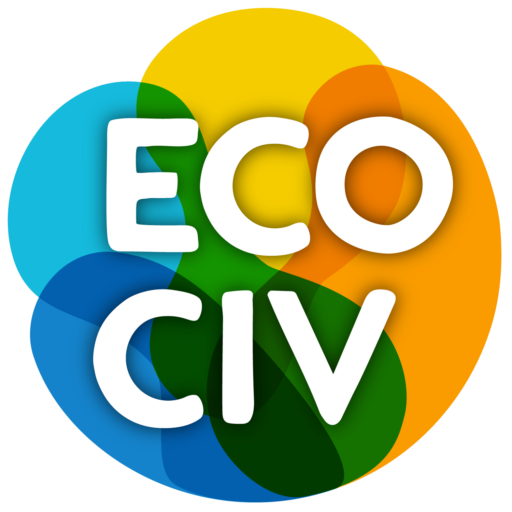
Holistic Education
Educational Plans for 2023
The Cobb Institute is very excited about its new certificate program. We have gotten off to a great start with Jay McDaniel’s introductory course and Andrew Davis's deeper dive into Whitehead's process philosophy.  Our hopes for this program have exceeded our expectations. We have 25 folks registered in the program, and provide openings for a small number of additional students in each course to allow for a total of 40 students. There are currently seats available in the Christian Process Theology course, taught by Jeanyne Slettom, which begins on November 12th. Check out our Learning Lab page for more information.
Our hopes for this program have exceeded our expectations. We have 25 folks registered in the program, and provide openings for a small number of additional students in each course to allow for a total of 40 students. There are currently seats available in the Christian Process Theology course, taught by Jeanyne Slettom, which begins on November 12th. Check out our Learning Lab page for more information.
In addition to our upcoming certificate program courses in 2023—Process Thought & World Religions, Jan. 11 thru Feb 15, and A Process-Relational View of Economics, which will run from March 1 thru March 22, 2023—we have two exciting offerings planned. In mid-February, Dr. Lynn Sargent De Jonghe, a member of the Philosophy of Education Society and the Center for Process Studies, will offer a Saturday morning discussion of her new book, Starting with Whitehead: Raising Children to Thrive in Treacherous Times.
Also, early next year Dr. Dhawn Martin, Director of the Source of Light Center at University Presbyterian Church in San Antonio, Texas, will facilitate a discussion of Dr. Catherine Keller’s book – On the Mystery. This class will meet for four to six weeks. For the last session Dr. Keller will attend for a question and answer session with the class. Dr. Martin is a former student of Dr. Keller’s.
Keep your eye on our home page and social media channels for information about these four offerings. There will be more to come.
Exploring Core Christian Doctrines and Themes from a Process Perspective
Taught by Jeanyne Slettom
Starts November 12, 2022
This course provides a basic introduction to key ideas in process thought, specifically as they are applicable to Christian theological categories. Topics will include major doctrines and encourage students’ own participation in the ongoing process of reconstructing major doctrines, ideas, and issues through the lens of process theology, with practical applications to ministry.
Spiritual Exploration
I often talk about gardening as prayer, worshiping on the altar of earth, praying with the soil. Cooking can be prayer. There is so much that goes into holiday meal preparation, how is that not a prayer recipe that includes ingredients such as love, labor, and hope? Dance can be prayer; music can be prayer. Tears can be prayer. Even sex can be prayer when we are mindful of the sacredness and treat it as such. The way we live our lives can be an embodied prayer.
At the Cobb Institute we often grapple with how to explain process in a way that differentiates it as a practice. Maybe we can’t. Like prayer, process philosophy should be embodied too. It’s not a separate thing that lives in books. It must live in our bodies. Currently the underlying cultural philosophy of separateness has saturated our lives. We need a revolutionary change. Some revolutions are quiet like prayer. We learned from Marjorie Suchocki that prayer affects God.
This November, I pray: Help, thanks Wow! Help me embody kindness and compassion, thank you for hearing all the ways I pray, and Wow! Life is so full of wow!
-Kat Reeves, Community Relations Specialist
“Our prayers make a difference to what God can do. God works with the world as it is. Quite simply, prayer changes the 'isness' of the world.”
–Marjorie Suchocki
John Cobb & Friends Gatherings
November 1: A Tribute to Rosemary Ruether
November 8: Barbara Muraca – Decolonizing Ecology: Process Ontology and Societal Relationships with Nature
November 15: Tim Eastman & Matt Segall – Big Bang? Multiple Universes? How Do Scientists Know?
November 22: John Buchanan – The 12-step Movement
November 29: Jeremy Fackenthal – Well-Being in Pomona: A Community in Progress

Conversations in Process Podcast
On this episode of Conversations in Process, Jay McDaniel and Jared Morningstar are joined by Brendan Graham Dempsey to discuss metamodern spirituality and possible connections with process theology. Brendan is a podcaster, author, community-builder, philosopher, and poet whose work focuses on the meaning crisis and the nature of spirituality in metamodernity.
The Latest From Our Blogs
Process in Praxis

Music for the Soul
By Srividhya Balaji September 30, 2022
We have, over the years, segregated sound into different buckets — Carnatic, Hindustani, Jazz, Folk, Western, etc. When pure sound is perceived only via such fragmentary walls of genres and strict disciplines, we lose touch with the fundamental experiential aspect of our own inner Naada (sound) and what remains is mere technique that doesn’t touch our souls. Srividhya Balaji weaves the sounds together infused in spirituality without boundaries. She moves beyond the confines of traditions and norms of classical forms of music into an adventure that asks us to embrace the novelty that she is creating and walk on uncharted territory, where neither the path nor the destination is clear.
Novel Becomings

The Need to Create
By Kathleen Reeves | October 17, 2022
We have a great need to visually express ourselves—be it on a cave wall, the side of a building, inside a subway car, on a piece of paper or canvas. Veronica Michalowski explores multiple mediums, allowing the creative idea to lead the way. She elevates the ordinary, such as eggs, guitars, even sewer covers and explores their possibilities.
What's new on our bookshelf?
Featured Books
In God's Presence: Theological Reflections on Prayer
by Dr. Marjorie Hewitt Suchocki
What are we really doing when we pray? Are we communicating with God or merely talking things over with ourselves? If you've ever asked yourself questions like these, this book is for you. In it, a distinguished process theologian explores the dynamics of prayer: what it is, what it isn't, and how various kinds of personal and corporate prayer work to bring us into the presence of God.
Help, Thanks, Wow: The Three Essential Prayers
by Anne Lamott
Readers of all ages have followed and cherished Anne Lamott’s funny and perceptive writing about her own faith through decades of trial and error. And in her new book, Help, Thanks, Wow, she has coalesced everything she knows about prayer to these fundamentals.
It is these three prayers – asking for assistance from a higher power, appreciating what we have that is good, and feeling awe at the world around us – that can get us through the day and can show us the way forward. In Help, Thanks, Wow, Lamott recounts how she came to these insights, explains what they mean to her and how they have helped, and explores how others have embraced these same ideas.
Insightful and honest as only Anne Lamott can be, Help, Thanks, Wow is the everyday faith book that new Lamott readers will love and longtime Lamott fans will treasure.
New Releases
Unearthing the Unknown Whitehead
by Joseph Petek
Unearthing the Unknown Whitehead argues that it is Alfred North Whitehead’s recently published Harvard lectures, and not his books, that contain the truest record of the development of his philosophy, including the false starts and dead ends that the published works obscure. This development could previously only be inferred as taking place in the gaps between books. It thus calls for a complete reconsideration of Whitehead’s philosophical corpus. Joseph Petek critically evaluates the accuracy and reliability of the student accounts of Whitehead’s recently published Harvard lectures and then examines these notes, along with a number of previously unknown essays, in order to trace previously unknown aspects of Whitehead’s philosophy and the development of his thought.
Glimpses of God: And Other Essays
by Paul O. Ingram
Glimpses of God: And Other Essays is a collection of theological reflections on seventeen interrelated subjects written by a historian of religion inspired by the work of Alfred North Whitehead and the process theological vision of John B. Cobb Jr. Each essay has its own distinctive topic while being interdependent with the other seventeen essays.
Mystery without Magic: Finding Faith in a Secular World
by Russell Pregeant
Where do we find meaning and value in our lives? Do we really need to choose between a religion that asks us to believe incredible things and a secularity that asks us to relativize value?
This book takes readers on a quest, a thought-journey in search of a faith that can provide a foundation for values in our secular and uncertain age. As our guide, author Russell Pregeant invites us to open ourselves to a different consideration of religious language—a more primal language that appeals to the shared world of human experience and points us to a depth dimension of life that transforms our ideas of reality itself.
The Call of the Spirit: Process Spirituality in a Relational World
by John B. Cobb Jr., Bruce G. Epperly, and Paul S. Nancarrow
"In a process relational world, to love God is to be swept up into God's own love for the world. It is to become a participant in God's great compassion. To develop spirituality in this relational world of ours is to develop a habit of attentiveness to the call of the Spirit, which will lead us ever more deeply into lives that are marked by the compassion of God. These nine essays form an integral whole, combining a careful analysis of relational dynamics with very practical suggestions for personal and communal ways of intensifying our spirituality. The essays flow from the wellsprings of spirituality in each of our authors; they are "lived" essays, and not simply theoretical discussions. To read the essays, then, is to be invited into the privilege of seeing how the call of the Spirit has been answered in each of these three lives. One can join with them by reading this book meditively, reflecting on one's own responses to the issues named. But one can also read this book as a kind of manual, giving tested instruction for persons and for communties to focus intentionally on increasing our spiritual awareness. In this sense, then, perhaps the book functions according to its apt title - it may, indeed, represent for us the call of the Spirit." - from the Introduction
The Prophet Amos Speaks to America: Ancient Wisdom for Contemporary Politics
by Bruce G Epperly
This book looks at the message that Amos proclaimed and applies it to parallel situations in modern America. Issues such as the worship of wealth (greed), privilege, and elites living off the labor of others are more similar in these two times and places than one might initially assume.
How can we respond as people of faith to the evils of our own time? Are we responsible to notice and take action? Is taking such action part of our faith?
If we listen to the prophet Amos, the answer is a resounding "yes." God cares about the weak, the oppressed, and the downtrodden, and looks to those with the means to help implement change. We are truly asked to take responsibility for the well-being of our neighbor.
Jesus Learns to Glow
Written by Timothy C. Murphy and Illustrated by C.J. Ward
This illustrated children’s book is for all those who love creatures that glow, with multiple ones encountered along the journey. Inclusive for both religious and nonreligious audiences, readers will be re-inspired to let your light shine. Over the course of one night, Jesus of Nazareth goes on a journey, making friends with a mushroom, firefly, algae, and a jellyfish, before learning to glow like they do. Sprinkled throughout are science facts about the creatures, as well as subtle biblical references for those familiar with the gospel story. It’s nonsupernaturalist, fantastical, ecologically sensitive, and uplifting all at the same time! Through rhythms and imagery, readers will encounter a relational worldview that reminds each of us to seek wisdom in surprising, and illuminating, places.

A BETTER WAY TO BUY BOOKS ONLINE
The Cobb Instutute is part of Bookshop.org. Bookshop.org began as an idea to help support bookstores and their communities at a time when more and more people were buying their books online. We saw an opportunity to create an alternative to Amazon for socially-conscious online shoppers. Amazon sells over 60% of all books in the US and is growing. That shift threatens the future of bookstores and will hurt readers, authors, and publishers who rely on a diverse, healthy ecosystem for books. We had a better idea — give readers the convenience of online shopping while supporting independent bookstores at the same time.
Giving

We are always hard at work trying to make a difference that matters.
We would love to know why the Cobb Institute matters to you.
Click here to tell us why you think our community matters.
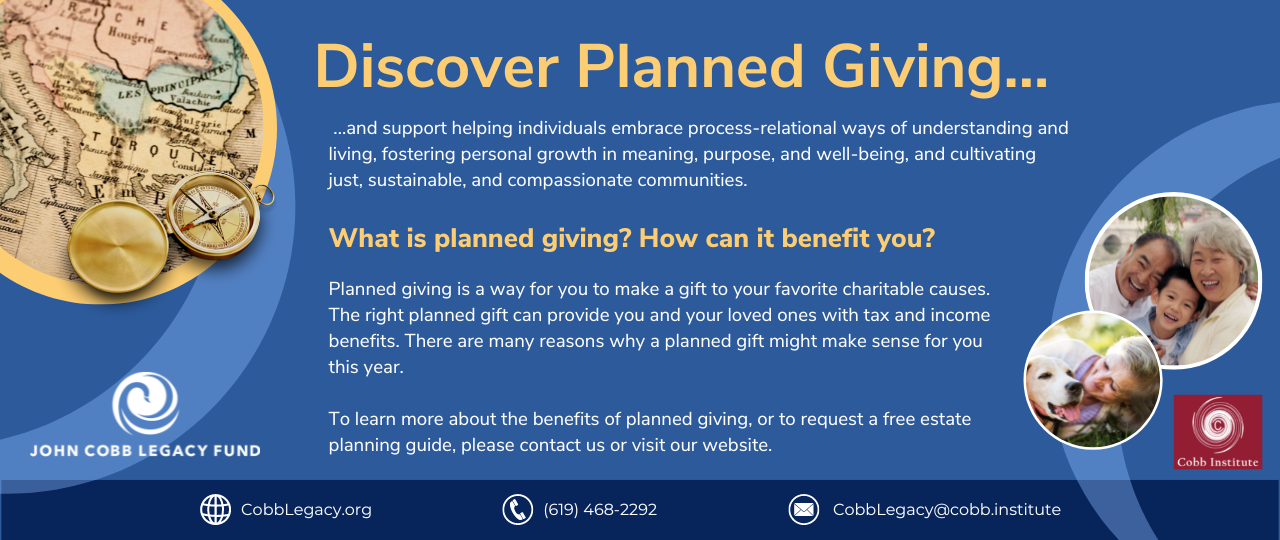
Would you like to create a lasting legacy of supporting individual growth in meaning and purpose along with the development of just, sustainable, and joyful communities?
Planned giving allows you to do just that with your estate planning. It enables you to remain in control of your financial assets during your life, plan to support loved ones, and provide long-term lasting support for causes you are passionate about.
There are many forms of planned giving, including bequests, gifts of cash, securities, or other property, through beneficiary designation on life insurance, or different forms of trusts. Whatever decision you may make, we want to express our deep gratitude. You are investing in the health of people, animals, and the communities they live in when you support the Cobb Institute.
“‘Amen’ is how most of us end our prayers, the standard response to prayers in the synagogue and the church and the mosque. The word means ‘And so it is” or ‘Truly.’ Well, that’s very nice, but what on earth does ‘it” mean? What is? The people praying are the ones saying ‘Amen,’ so it’s not God saying bossily, like Judge Judy, ‘So it is. All done. Go away. Get some help with that anger.’ It is us, the damaged, hopeless people, lifting up our hope, hate, gratitude, fear, and shame, saying, Boy, do we hope we are right about this God stuff.”
–Anne Lamott, Help Thanks Wow






